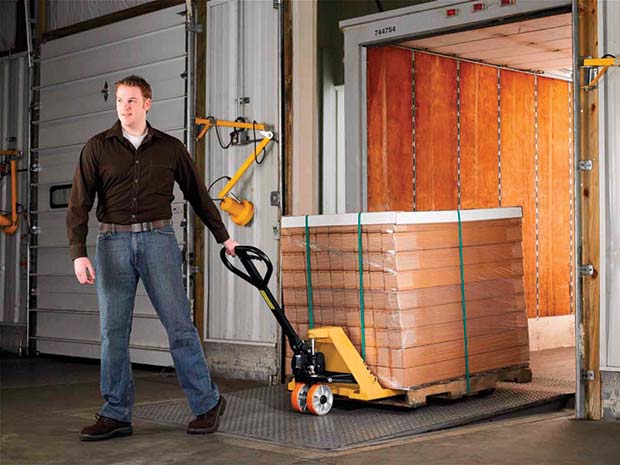The cost of accidents

Pallet trucks, be they powered or unpowered, are responsible for a large number of accidents within the materials handling industry.
While rarely fatal, these accidents commonly result in serious injuries to the legs and the feet.
Incidents of this kind impact directly on the safety of your workforce, as well as your company’s operational efficiency.
Training
A survey conducted by the FLTA yielded concerning results. One in ten employers wrongly believed that unpowered hand pallet trucks can be operated without training.
Under Regulation 9 of the Provision and Use of Work Equipment Regulations 1998 (PUWER 98), it is a legal requirement that all employers provide adequate training for all person using work equipment.
It is worth noting that the same regulation states that supervisors of such workers must have received similar training.
PUWER 98 covers all types of pallet trucks – from pedestrian power pallet trucks to sit-on models.
When considering training, it is important to remember that the level of training, and the time it will take, will vary according to the complexity of the equipment used.
Safety is no laughing matter
There is an abundance of online videos featuring workers recklessly flaunting basic health and safety regulations by racing, jumping and playing about on pallet trucks. While these videos might be amusing to those who don’t know better, they are truly alarming to those who recognise the dangerous implications such horseplay can have.
Potential for serious injury aside, the foolish workers and their employers, if identified by the HSE, could be fined thousands of pounds.
Consequently, pallet truck operators should always be supervised and any signs of unsafe behaviour should be dealt with accordingly.
Best practice
Ensuring that some key safety points are adhered to will reduce the risk of pallet truck accidents in your workplace:
• Equipment should be operated solely by workers trained and authorised to do so.
• When using a pedestrian power pallet truck, the operator should always face in the direction of travel, but to one side of the control handle.
• The operator should get off the vehicle before trying to pick up a pallet or negotiate any form of obstacle.
• Extra care must be taken on wet or slippery surfaces or near to edges such as loading bay docks or steps.
• The truck operator should never allow themselves, or others, to become trapped between the equipment and other objects.
• Employers should ensure that there are clear rules about how and where such equipment can be operated.
Pallet Care
Damaged pallets can be a general hazard in the warehouse. They are particularly dangerous for fork lift operators and those who work in close proximity to fork lift trucks.
When pallets are being used with a fork lift truck, they form a part of the lifting system and should be regarded with due seriousness:
• Any damaged pallet should be taken out of service as soon as damage occurs or is noticed.
• A system should be established for the safe transfer of goods from a damaged, laden pallet to its serviceable counterpart.
• Pallets should only be repaired by the pallet manufacturer, its agent or a specialist pallet repairer.
Free fact sheets covering these topics, alongside a host of others answering common fork lift truck queries, can be downloaded at www.fork-truck.org.uk/fact-sheets.




Comments are closed.